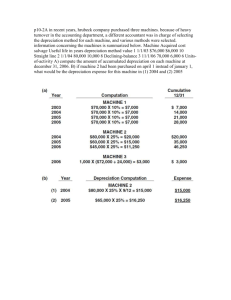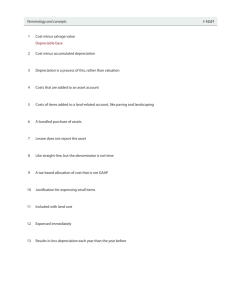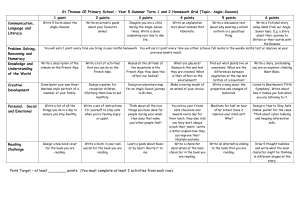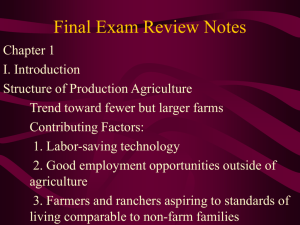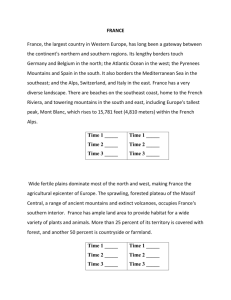AS Accounting Welcome Booklet Department
advertisement
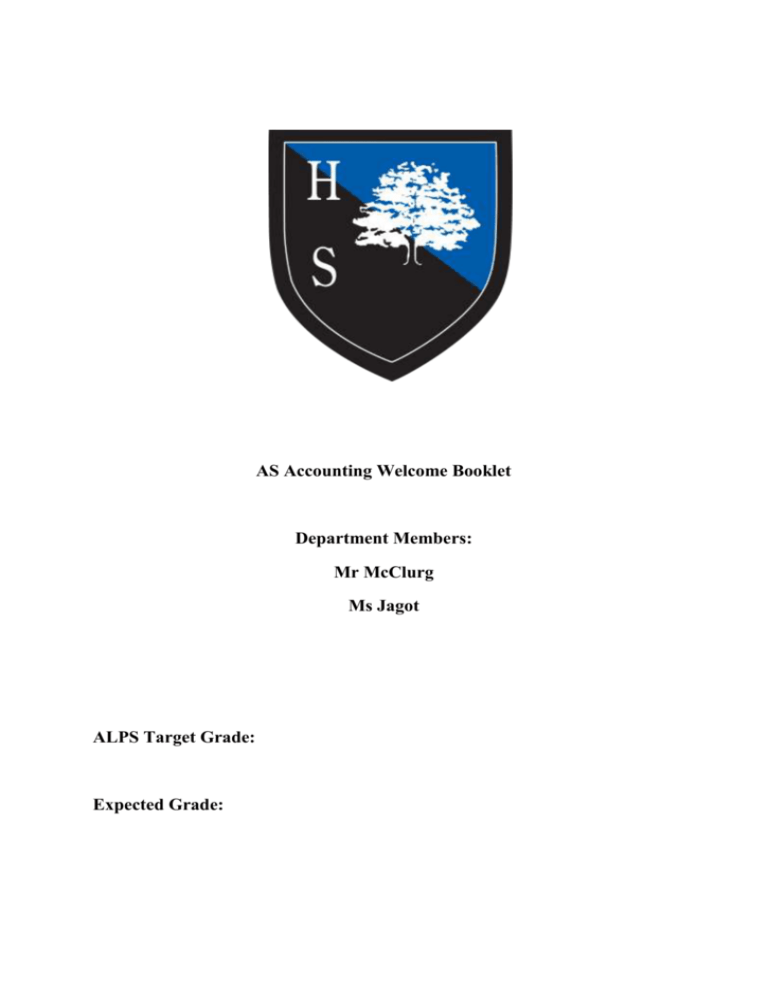
AS Accounting Welcome Booklet Department Members: Mr McClurg Ms Jagot ALPS Target Grade: Expected Grade: Welcome: Hello and welcome to Heathcote Sixth Form’s Accounting and Economics department. You have embarked upon a fascinating course that teaches both theoretical and vocational skills. You have chosen to study A-Level Accounting. The course is rigorous and fast-pacing. You learn a lot in your units and it is vital you keep up with the work. Accounting starts with the basics and works up to more advanced work; with each new element being taught depending upon the last element. You must master each week’s learning and not leave it to the last minute. You will be tested regularly. From early on in your course you will be assigned an ALPS Grade and an Expected Grade. ALPS Grades are school target grades which represent the minimal level of achievement that we expect from you. Expected Grades are what we use to determine your actual progress. These will be challenging and change depending upon your homework/test results. Any test result that falls below the ALPS Grade will result in a resit being done and we communicate regularly with parents on your progress (both outstanding and fail). A-Level Accounting is formally assessed at the end of the year, with Units 1 and 2 examined in May 2015. There is no coursework. However Accounting has the highest fail rate of any AS Qualification, reflecting the difficulty of the test and the stringent work needed to pass. The responsibility of your success is on you. After each test, you will be required to review your feedback and set specific targets to improve. You will then be required to meet those targets and evidence will be sought to ensure you are improving. Finally on behalf of the department, I hope that you enjoy this subject and that you find it engaging and challenging enough. You only get out of this what you put in. Mr McClurg (Lead Teacher of Accounting & Economics) Expectations on this course From the teacher: All students can achieve the best grade possible All students will enjoy what they learn Subject knowledge is up-to-date as well as current resources available for all students Homework is given weekly. This will be assessed weekly, with appropriate feedback (including guidance on how to improve your work) Tests/Summative Assessment every 3-4 weeks, with individual teacher time to discuss results and personalised feedback for each student. Feedback will be given in the next lesson Dedicated student time after school for any questions/queries All resources are placed on the Central Resource Library, so students can access their work during absence From the student: All students are to uphold a respectful and courteous manner to each other and to the teacher at all times, inside and outside of school (e.g. on school trips) Attendance and punctuality is crucial. If you are likely to be absent for a few days, it is your responsibility to get all materials and catch up with all work missed, including doing any assigned homework. Persistent lateness to, and absence from, class will result in disciplinary procedures, in accordance to sixth form policy A minimum of 3 hours of study per week (outside of class) is required to properly do all the assigned reading and work for the class. If you want to do well, a recommended 5 hours per week should be spent on independent study Maintain an organised work folder. We will look through your folder and books every 3-4 weeks. All work should be brought to class, including all past papers and stationery (calculator, pens etc.) Homework to be submitted on time with your name placed at the front of your work. Not doing so, without a valid reason, will result in detention. Persistent lateness of homework will result in contact with parents/guardians and referral to the Lead Teacher Attendance at revision sessions held is voluntary, but it is in your best interest to attend. Those that have attended revision sessions previously have done better in their overall grade outcomes If you have any problems during this course please contact us as soon as possible. Our door is always open. What you will learn (useful as revision aid) Unit 1: ACCN1 – Introduction to Financial Accounting Written examination: 1 hour 30 minutes Unit 2: ACCN2 – Financial and Management Accounting Written examination: 1 hour 30 minutes Unit 1: ACCN1 – Introduction to Financial Accounting Introduction to financial accounting • A business / organisation and what its purpose is • Presentation of a business / organisation’s financial information • The fundamental accounting concepts which govern financial reporting • Identification of a series of stakeholders to a company Recording financial data • Business transactions and the duel effect of these transactions • Recording entries in the Books of Prime Entry and the Memorandum ledgers • Using this information to monitor trade receivables and trade payables • Double Entry accounting and the "T-Account" • Introduction to the accounting equation Checking accounting records • Preparing a trial balance and ensuring it balances • Reasons why a trial balance would not balance (summary of the various errors) • The impact errors make on the profit/ (loss) and how these can be corrected • Suspense account (neither balance sheet nor income statement) Balance Sheet and Income Statement • Familiarisation with income statement and balance sheet proformas • Adjustments to trial balance (depreciation, bad debts, accruals and prepayments) • Case study to prepare financial statements Unit 2: ACCN2 – Financial and Management Accounting Business entity concept • Types of business entities • Advantages and disadvantages of these organisational structures Accounting concepts • Background to accounting concepts and the IASB’s framework • Qualitative characteristics of financial information • Cover the concepts relating to the qualitative characteristics (historic cost, going concern, accruals, consistency, prudence, materiality, realisation, business entity and objectivity) Further aspects of preparing primary accounts • Advanced look at balance sheet and income statements and adjustments. • Specifically for bad debts and allowances for doubtful debts, income due and received in advance • Depreciation of non-current assets; Reasons why a business needs to depreciate • Introduction to new depreciation method – reducing balance – and comparison of the two methods • Accounting for the disposal of non-current assets, incorporating accumulated depreciation account entries • Capital vs. Revenue expenditure Limited Company accounts • Assess Loan capital vs. Share capital as a source of finance - advantages and disadvantages • Updating income statement and balance sheet with interim and final dividends; corporation tax liability; share premium; revaluation of fixed assets • Understand what bonus issues / rights issues are and clearly identify the differences between them • Preparation of Statement of Changes in Equity • Make the necessary entries to the accounts for bonus and rights issues Ratio analysis and business performance • Interpreting financial statements of sole traders and limited companies • Comparing ratio analysis across competitors, across accounting periods and with other businesses • Consider how various transactions effect ratios consider also the limitations of these ratios • Understand that cash does not equal profits Introduction to budgeting • Budgeting within business • Importance of budgeting within an organisation • Assumptions made in budgets and their weakness • Preparing cash budgets ICT within accounting • Learn how ICT helps with regard to double entry book keeping; maintaining and managing stock levels; monitoring trade receivables; preparing budgets • Advantages / Disadvantages with ICT tool Additional resources Textbook for the course: AS Accounting for AQA (Cox and Fardon, Osborne Books) – required reading. Books must be purchased from the department Department Website – advise you to bookmark this for twitter/competition info: http://www.heathcoteschool.com/accounting_and_economics.php Twitter: @HSEcon (Accounting/Economics resources/exam tips/news) Pre course tasks Before you begin this course, I want you to research online, and answer, the questions that follow. You must bring this work with you on the first day of your course. 1. What is accounting? 2. Why do you want to study accounting? (e.g. interesting? 4th A-Level?) 3. Why do firms keep accounting records? Future studies With an AS or A Level in Accounting, you can study for a degree in Accounting or a similar subject such as Business, Law or Mathematics. You can also choose to enter further accounting training via a professional body such as CIMA or ACCA. During the course, you will develop skills in reason, planning and strategic thinking that will be valued by employers in any industry. However, if numbers are your thing, then you may want to consider a career as an Accounting Technician, Investment Banker, Financial Risk Analyst or Treasurer. An A Level in Accounting can lead to careers in areas such as business, marketing, management and accountancy as well as into higher education.
